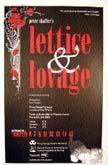
Every history major should read Peter Shaffer’s play Lettice and Lovage. Almost everyone else ought to enjoy it too, but history students will best understand the attempts of the characters to make history come alive. Shaffer is best known for his plays Equus and Amadeus, both intense dramas about conflicts between two very different men. Lettice and Lovage flips the formula around, and in a comedy of wits tells the story of two women whose surface differences gradually melt away to produce a strong friendship.
The play consists of five characters and a crowd of extras, but the only characters with any real depth are those of the leads, Miss Lettice Douffet and Miss Charlotte Schoen.
As the play opens, Lettice is a tour guide at a rather dank, uninteresting castle in Great Britain. As she drones on with the approved monologue of sterile facts, she is quick to note that her audience is unabashedly underwhelmed by her material.
Almost accidentally, Lettice discovers her gift for improving the truth. Over the course of several scenes, Lettice adds to the monologue, blending fact and fiction (Is it really fiction? As Lettice quickly points out, no one can prove that everything didn’t happen exactly as she said) to create a series of gripping tales of suspense, melodrama, and intrigue.
Everyone loves Lettice’s new style, except for a few party poopers who are sticklers for historical accuracy. They quickly alert Charlotte Schoen, head of the historical society in charge of the castle, who is incensed at Lettice’s artistic license.
Lettice is fired, but she can’t stop using her imagination to work the drama of history into her life. Even working at a supermarket, handing out free samples of processed cheese, Lettice can’t resist giving the cheese a much meatier biography.
When Charlotte comes to visit, she reluctantly allows herself to be drawn into Lettice’s histrionic presentations of history. Of course, there are some contrivances and plot twists, but the play’s climax comes from the development of two unique characters.
Why did I enjoy this play so much? I hate it when Hollywood sees fit to bend the facts for inane reasons. Nothing spoils a movie faster for me than seeing a historical figure butchered or bowdlerized in order to have a flawless hero, a despicable villain, or to get an actor an Oscar nomination.
It’s quite all right to play merry hell with the lives of fictional characters you’ve created, but do screenwriters really have the right to use real people as their pawns? There’s a huge difference between legitimate history and, to use Shaffer’s words, a “fantasia based on fact.”
(Dear readers, for those of you who disagree with my stances and question the possibility of genuine historical truth, for crying out loud, please don’t send me e-mails explaining the finer points of Foucault and postmodernism.)
I have trouble forgiving screenwriters for playing fast and loose with historical facts, but I harbor no such animus toward Lettice. Perhaps it’s the fact that she’s so open about the fact that most of what she says is her own creation, or the sheer exuberance she has in telling her tales. I laughed out loud several times while reading the dialogue (I haven’t seen the play in performance, only read it.), and the characters really grew on me.
Though not as colorful as her counterpart, the character of Charlotte is engrossing, and subtly sympathetic.
By the way, for those of you who wish to know what lovage is, it’s a cordial made by Lettice from hard liquor, sugar, and a number of other ingredients.
I encourage everyone to bring the excitement of history into your lives as Lettice and Charlotte do, but please, don’t try this in class. Lettice and Lovage just goes to show you that you can have a great time bringing history to life, just so long as you don’t have to cite your sources.
